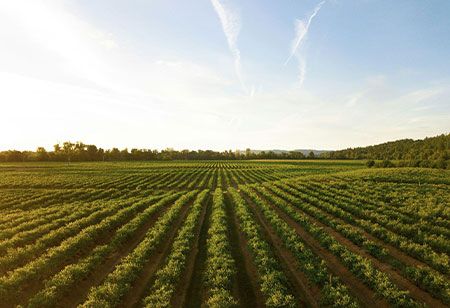
The agricultural industry has seen a dramatic shift in recent decades. What was once a labor-intensive process reliant on manual and rudimentary tools has evolved into a highly mechanized and efficient system thanks to industrial processes and machinery. From planting to harvesting, contem- porary farming relies on innovative technology and equipment to increase production, reduce waste, and promote sustainability.
An important step in the farming process is planting. The traditional method entails dispersing seeds by hand, but modern farming practices and machinery have substantially altered the planting process. Precision planters have replaced this traditional method; instead, these machines ensure the proper depth and spacing for seeds. They get maximum germination rates and crop yields by doing so. Precision planters are also integrated with GPS technology and automated systems that enable the precise positioning of seeds, decreasing waste and increasing efficiency.
Additional equipment, including seed drills and air seeders, has aided the planting process. These machines scatter seeds evenly throughout the field. This encourages uniform growth and reduces the need to replant. The utilization of machinery during planting also saves time. It guarantees crops get the greatest possible start, increasing productivity.
Once the seeds are in the ground, you must water them thoroughly to ensure good growth. Industrial irrigation methods, such as pivot and drip irrigation, have influenced crop watering practices. Pivot irrigation systems employ a central pivot point to deliver water in a circular pattern. This maintains equal coverage across a large area. Drip irrigation, on the other hand, provides water directly to the base of each plant. This step reduces water waste while increasing efficiency.
Automated systems frequently operate these irrigation systems. They monitor soil moisture levels and meteorological conditions, Adjusting water delivery in real time. This level of precision helps conserve water and cut expenses. They also encourage sustainable farming practices. Farmers can ensure their crops receive adequate water and achieve optimal crop development and yield by incorporating industrial-grade irrigation systems. For farmers looking to embrace these innovations, Texas John Deere dealer offers a range of advanced tractors and machinery that support modern agriculture practices.
Fertilization has benefited from industrial advances. Traditional means of applying fertilizer, such as by hand or rudimentary equipment, have been suspended. Equipment is employed to ensure accurate application. Fertilizer spreaders and sprayers with GPS and variable rate technology (VRT) provide targeted applications, decreasing chemical waste and minimizing environmental effects.
These machines control fertilizer application according to soil conditions and crop requirements, guaranteeing that each field section receives the necessary nutrients. This improves crop growth. It also lowers the likelihood of fertilizer runoff, which can contaminate water supplies.
To protect and ensure high harvests, insect and weed control must be maintained. Modern agriculture relies on industrial gear to properly address these difficulties. Crop sprayers have become essential equipment for farmers. They can cover an extensive area quickly. Herbicide applicators help to apply pesticides and herbicides with precision.
Pest and weed management uses drones and self-driving cars equipped with sensors and cameras. These devices can detect specific locations of infestation. They can specifically target these locations, eliminating the requirement for chemical blanket applications. Controlling pests and weeds reduces the environmental impact of chemical use.
The incorporation of industrial processes and machinery into modern agriculture has transformed farming. It has improved the process efficiency. From planting to harvesting, this transition has resulted in agriculture sustainability. Farmers may keep their operations competitive by investing in cutting-edge technology. This stage lays the groundwork for a sustainable and wealthy future.
We use cookies to ensure you get the best experience on our website. Read more...